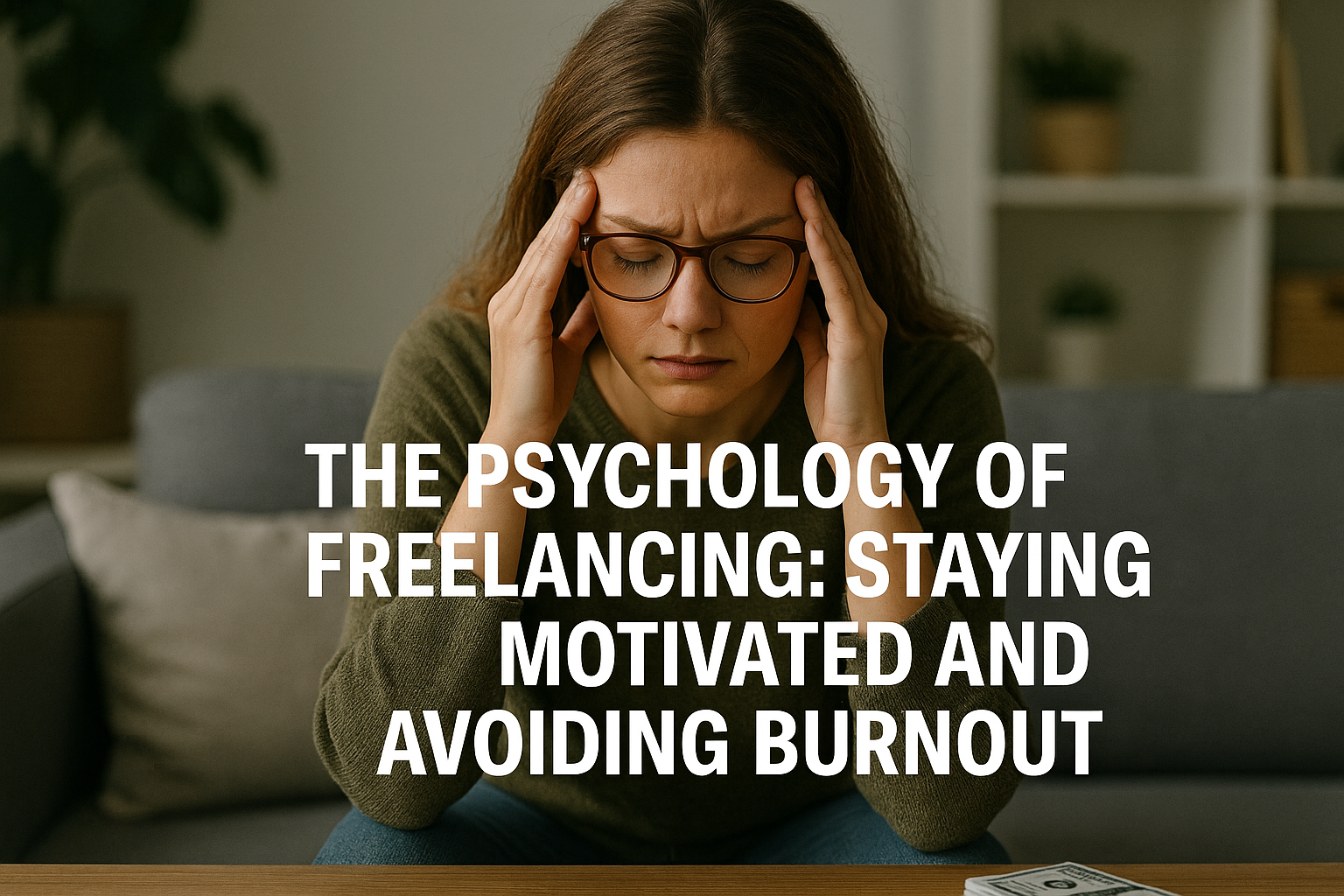Freelancing promises freedom—freedom to choose your clients, control your schedule, and work in your pajamas. But with that freedom comes a new set of psychological challenges: isolation, lack of structure, motivation slumps, and the very real risk of burnout.
Understanding the mental game of freelancing is just as important as mastering your writing skills. In this article, we’ll explore the psychological dynamics of freelance life and share strategies to help you stay productive, motivated, and healthy.
Why Freelancers Struggle with Motivation
When you don’t have a boss or team holding you accountable, it’s easy to let things slide. That article can wait. That pitch doesn’t have to be sent today. But over time, procrastination snowballs into guilt, stress, and missed opportunities.
Some common causes of low motivation among freelancers include:
- Lack of structure: No fixed hours or deadlines can lead to chaos.
- Decision fatigue: Constantly choosing what to do next drains mental energy.
- Imposter syndrome: Doubting your abilities can paralyze your productivity.
- Isolation: Working alone for long hours can feel draining and uninspiring.
Let’s break down how to fight these challenges head-on.
Build a Consistent Routine
Routine is the antidote to chaos. You don’t need a 9–5 schedule, but you do need consistency.
Here’s how to build a productive freelance routine:
- Set working hours. Even if they vary daily, know when you’re “on” and “off.”
- Create a startup ritual. Coffee, meditation, a walk—something that signals “work mode.”
- Use time blocks. Dedicate chunks of time to different tasks (writing, emails, breaks).
Apps like Google Calendar, Notion, and Sunsama can help structure your day.
Set Meaningful Goals (And Break Them Down)
Motivation thrives when you know what you’re working toward. Define goals that are:
- Specific: “Land 3 new clients this month.”
- Measurable: “Write 10,000 words/week.”
- Time-bound: “Launch my portfolio by June 15.”
Then, break big goals into daily and weekly tasks. Use tools like Trello or Todoist to stay on track.
Use Psychology to Stay Focused
Certain mental hacks can help you stay productive:
1. The Pomodoro Technique
Work for 25 minutes, take a 5-minute break. Repeat. Every 4 cycles, take a longer break.
Why it works: Short sprints keep your brain focused and fresh.
2. Reward Yourself
After completing a task, treat yourself: a walk, a snack, or 15 minutes of social media guilt-free.
3. Visual Progress
Track your writing streaks on a calendar or app. Seeing your progress builds momentum.
Combat Isolation with Connection
Isolation is one of freelancing’s biggest mental health threats. But you don’t have to go it alone.
- Join online communities like Freelance Writers Den, Peak Freelance, or Twitter threads.
- Work from co-working spaces or coffee shops a few days a week.
- Find an accountability buddy to check in weekly on goals.
Human connection boosts morale and keeps your mind sharp.
Avoiding Burnout: Know the Warning Signs
Burnout doesn’t happen overnight. It creeps in slowly:
- Chronic fatigue
- Cynicism or detachment from work
- Trouble focusing
- Feeling overwhelmed by simple tasks
If you notice these signs, take them seriously. Left unchecked, burnout can derail your career.
How to Recover:
- Take real breaks. Not scrolling on your phone—step away completely.
- Say no more often. Don’t overcommit just to please clients.
- Take a vacation. Even a few days away can reset your mind.
Redefine Success and Rest
Many freelancers tie their worth to productivity. But constant hustle leads to breakdowns, not breakthroughs.
Real success includes:
- Being proud of your work
- Having time for family and hobbies
- Feeling physically and mentally well
You don’t need to “earn” rest. Rest is part of the job.
Create a Workspace That Supports Your Mindset
Your physical environment influences your mental state. Make your home office a place that energizes and motivates you.
- Declutter. Clear space, clear mind.
- Add natural light. Sunlight boosts mood and focus.
- Include inspiration. Hang your goals, quotes, or artwork you love.
Noise-canceling headphones, good lighting, and an ergonomic chair are investments in your mental health.
Work With Clients Who Energize You
Not all freelance gigs are worth it. Some clients drain your energy more than they pay.
Signs of draining clients:
- Constant scope creep
- Poor communication
- Disrespecting deadlines or boundaries
Instead, seek clients who:
- Appreciate your work
- Pay well and on time
- Are clear in their expectations
Saying no to bad clients makes room for better ones—and protects your peace of mind.
Final Word: Build a Career That Feels Good
Freelancing is more than a job—it’s a lifestyle. And like any lifestyle, it should support your well-being, not sabotage it.
By understanding the psychological challenges and building systems to support yourself, you can create a freelance writing career that not only pays the bills but also brings joy, purpose, and freedom.
Take care of your mind, and your business will follow.



